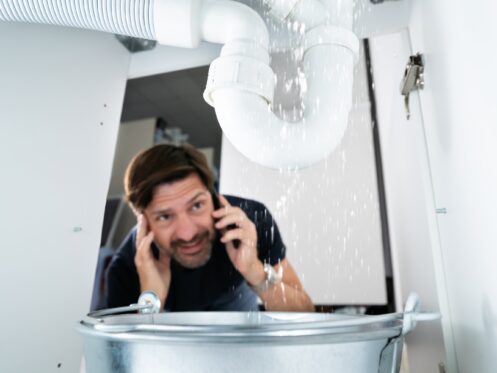Caring for the plumbing system in your Englewood, CO home is a critical part of protecting your health, your investment, and your finances. Although minor leaks and smelly, slow-moving drains might seem like minor issues, they can have a major impact on your well-being. Read on to discover eight dangers of neglecting your plumbing system.
1. Whole-House Backups
A whole-house backup can occur when the sewer line that routes your household’s waste to the municipal sewer system is clogged, crushed, offset, or otherwise damaged. These events send raw sewage rushing back into homes via all connected drains and appliances. This pathogenic waste is rife with harmful chemical and biological contaminants.
Among the most common signs of an impending whole-house backup are:
- Multiple clogged or slow-moving drains
- Frequent drain issues
- Noisy, gurgling drains
- Pungent and pervasive drain odors
- Wet terrain above sewer lines
Overlooking these and other symptoms can leave you with damaged floors and sub-floors, an elevated risk of serious mold infestation, damaged appliances, and many other problems. Fortunately, most whole-house backups are completely preventable when maintenance experts in sewers, drains, and kitchen and bathroom plumbing catch and correct the underlying issues early on.
2. Increased Humidity
A well-functioning plumbing system will route fresh, potable water to your taps and dirty wastewater to your septic tank or the sewer system without any leaks or spillage. If you have leaky water supply pipes behind your drywall or clogged drains, spilled or trapped water will eventually evaporate and add moisture to your indoor air.
According to the U.S. Environmental Protection Agency (EPA), all homeowners should keep their indoor humidity below 60%. As per the U.S. Centers for Disease Control (CDC), indoor humidity levels above 60% create the ideal conditions for mold. Even a minor unchecked plumbing issue can leave you with condensation-covered drywall, windowsills, and windows, and dark, damp patches of harmful fungal growths.
Treating mold in a home with unchecked plumbing problems is all but impossible. Easily the most important part of any successful mold remediation plan is finding and fixing the underlying cause of excess humidity first. Taking good care of your home’s plumbing system will stave mold problems off and make existing mold issues much easier to treat.
3. Contamination and Illness
Every homeowner should schedule professional drain cleaning services at least once each year. The biofilm and harmful pathogens found in dirty, slow-moving drains aren’t guaranteed to stay put. Cleaning your drains annually is a great way to ensure that germs in your drains don’t contaminate the foods you wash in your kitchen sink or find their way onto your skin or hair when bathing or showering.
Being negligent about maintaining your plumbing system can lead to contamination and illness in other ways. Septic tank leaks and leaky sewer pipes can saturate landscaping soils with raw sewage. This effluence can contaminate gardens, leach into groundwater, and render outdoor areas temporarily unusable. Regular plumbing inspections and timely maintenance and repairs can help you avoid these problems and more, including contamination from:
- Broken or leaky toilet seals
- Cracked wastewater pipes inside buildings
- Damaged p-traps
- Backflow
Effective plumbing systems help modern homeowners maintain clean, healthy living spaces. When plumbing systems are damaged or ill-maintained, they’re among the top causes of skin infections, gastrointestinal distress, and other potentially serious ailments.
4. Water Damage
Leaky pipes can damage your home from its foundation to its roof. If you have a slab leak caused by a damaged sewer pipe or water line, you’ll eventually notice settlement cracks in your drywall and roofing problems, like loose or torn flashing. As wet foundations crack and shift, entire buildings move with them. In some instances, these changes adjust the positions of window and door frames and may make it difficult to open windows and doors or close them securely.
Even minor plumbing leaks in other areas can lead to:
- Discolored ceilings and drywall
- Blistered, peeling paint
- Warped sub-floors and floors
- Loose tiles and curled linoleum
The longer you wait to identify and address a plumbing issue, the more water damage your home will sustain.
5. Rising Water Bills
A single plumbing leak can cost you a veritable fortune over time. According to the EPA, a constantly running toilet wastes about 200 gallons of water each day, and a leaky faucet wastes about 3,000 gallons of water annually. If you’re tired of paying for water that flows down your drains unused, give us a call and have your plumbing system inspected.
6. Property Value Losses
Few people are eager to purchase homes with obvious evidence of past water damage. When it comes to preserving your home’s value and marketability, it’s far better to prevent a whole-house backup than to clean up after one. To consistently keep your home in an appealing and salable condition, schedule whole-house plumbing inspections and professional drain cleaning each year. You should also have your home’s sewer line inspected and cleaned every 18 to 24 months.
7. Decreased Enjoyment
Plumbing problems make homes less enjoyable to use and live in. No one wants to relax in a space that smells like sewer gas or has rank, moldering odors. The excess humidity from an unchecked plumbing leak or a slow-moving drain can make your indoor air feel heavy and oppressive. Worse still, excess humidity and the resulting mold problems can also cause unpleasant indoor air quality (IAQ) symptoms like:
- Eye and skin irritation
- Frequent respiratory and ear infections
- Coughing, wheezing, and labored breathing
- Sinus irritation
Plumbing problems that affect IAQ can be especially problematic for those with chronic respiratory conditions, like asthma and allergies. They can also diminish your sleep quality and leave you feeling irritable and unrested.
8. Lost Warranties
Many components throughout your plumbing system come with manufacturer warranties, including your plumbing-connected appliances and other plumbing fixtures. These guarantees cover the costs of replacing components that are defective or have other manufacturer-related problems. However, manufacturer warranties are always mutually binding.
Although product manufacturers will pay for their own mistakes, they’ll only do so if you take good care of your plumbing system. Failing to perform the plumbing system maintenance that’s listed in your warranty agreements could lead to the loss of your warranty protections. Even if your warranties aren’t voided due to negligence, evidence of negligence might lead to longer processing times for your claims and more out-of-pocket spending.
We help homeowners in Englewood maintain healthy, high-functioning plumbing systems. As a locally owned and operated company, we’ve proudly served the region since 1998. We offer expert plumbing services like kitchens and bathrooms, water heater maintenance, and general plumbing maintenance. You can count on us to spot and resolve slow and hidden leaks and all other common plumbing issues. If you need a whole-house plumbing inspection, drain cleaning, or other preventative plumbing services in Englewood, give Horizon Services a call today to schedule an appointment!


